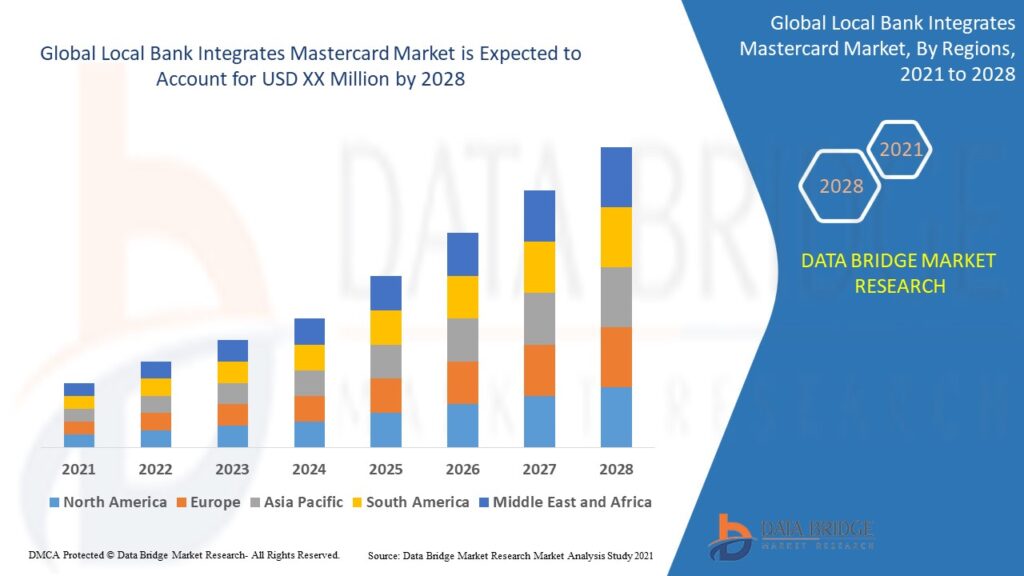Introduction
In an increasingly digital and connected financial landscape, local and regional banks face mounting pressure to modernize their services and meet the evolving expectations of consumers and businesses alike. One significant step forward is the integration of global payment networks such as Mastercard into local banking ecosystems. This strategic collaboration not only enhances the customer experience but also strengthens the competitive position of community banks within the larger financial market.
The Local Bank Integrates Mastercard Market is emerging as a noteworthy trend, with banks seeking to expand card services, tap into global transaction capabilities, and leverage Mastercard’s extensive technology and security infrastructure.
Source : https://www.databridgemarketresearch.com/reports/global-local-bank-integrates-mastercard-market
Why Local Banks are Turning to Mastercard
1. Growing Demand for Digital Payments:
Customers today expect seamless payment solutions that work everywhere, whether online, in-store, or across borders. By integrating Mastercard’s network, local banks can provide debit, credit, and prepaid card services that meet these expectations.
2. Financial Inclusion:
Mastercard’s partnerships can help local banks reach underbanked or previously unbanked populations with accessible card products and digital wallets, empowering more people to participate in the formal financial system.
3. Enhanced Security:
Fraud prevention is a top concern for banks. Mastercard’s advanced fraud detection, tokenization, and biometric security tools help local banks protect customers and build trust.
4. Innovation Enablement:
Mastercard’s ecosystem includes cutting-edge technologies like contactless payments, mobile wallets, and integration with fintech solutions. Local banks gain a technological edge by leveraging these innovations without developing them in-house.
Key Benefits for Local Banks
Improved Customer Experience:
With Mastercard products, local banks can issue globally accepted cards that provide reliable, fast, and secure payments — features that resonate with modern consumers.
Increased Revenue Streams:
Card issuance opens up new revenue through transaction fees, interchange income, and value-added services like rewards programs.
Brand Strengthening:
Partnering with a trusted global brand like Mastercard enhances the credibility of local banks, especially among younger, digitally savvy customers.
Access to Global Networks:
Businesses and retail customers gain the ability to make international purchases and travel payments without barriers, broadening the bank’s appeal.
How Integration Typically Works
A local bank’s integration with Mastercard often involves:
-
Issuing Debit, Credit, or Prepaid Cards: Customized to the bank’s customer base, from standard consumer cards to co-branded and premium options.
-
Upgrading Infrastructure: Enhancing card management systems, fraud monitoring, and compliance with global payment standards.
-
Training & Customer Support: Equipping bank staff to promote card products and support customers using new payment methods.
-
Marketing Collaboration: Co-branded campaigns to educate customers and attract new cardholders.
Market Trends Driving Integration
1. Contactless Payments Growth:
Contactless transactions have surged across Europe, North America, and emerging markets alike. Local banks benefit from Mastercard’s leadership in contactless technology, enabling them to keep pace with changing consumer habits.
2. Mobile Wallet Adoption:
Integration with digital wallets like Apple Pay and Google Pay is easier through Mastercard’s APIs and partnerships, giving local banks an edge in mobile-first markets.
3. SME Card Products:
Small and medium-sized enterprises (SMEs) increasingly demand flexible payment tools. Mastercard’s business card solutions help local banks serve this vital sector with expense management, rewards, and global acceptance.
4. Sustainable Card Initiatives:
Sustainability is gaining traction. Some local banks are now issuing eco-friendly Mastercard products made from recycled materials, aligning with customers’ environmental values.
Challenges and Considerations
While integration brings clear benefits, local banks must navigate:
-
Compliance and Regulation: Ensuring adherence to local and international payment standards.
-
Technology Investments: Upgrading legacy systems to handle real-time payments and transaction processing.
-
Customer Education: Helping customers understand new features like contactless payments, fraud protection, and digital wallet usage.
-
Competition: Differentiating their Mastercard offerings in a crowded market where larger banks and fintechs also provide innovative card solutions.
Regional Outlook
The integration trend is particularly strong in regions where local banks are trusted community institutions but have lagged in digital transformation. For example, small banks in parts of Europe, Asia, and Latin America are aggressively adopting Mastercard partnerships to stay relevant.
In North America, community banks and credit unions are also embracing Mastercard to compete with big banks and neobanks, offering modern card products while maintaining personalized service.
The Road Ahead
Looking forward, the Local Bank Integrates Mastercard Market is poised for steady growth as digital payments expand and consumer expectations evolve. Local banks that adapt quickly can gain a competitive advantage, retain customer loyalty, and even attract new generations who value convenience, security, and global access.
Through strategic partnerships with Mastercard, local banks can deliver a world-class payment experience without sacrificing the trust and community focus that make them unique. This balance — blending global innovation with local service — is key to their continued relevance and success in the digital financial age.
Conclusion
The integration of Mastercard into local banking is more than a technical upgrade — it’s a smart investment in modern banking capabilities that empower communities, strengthen customer relationships, and position local banks for long-term growth in an increasingly digital economy.
https://groups.google.com/g/marketresearch15/c/EXz7QpzbieE
https://yulojk.blogspot.com/2025/07/cell-based-immunotherapy-market-growth.html
https://quicknote.io/4997e400-56f6-11f0-ad88-012a372a5541/edit
https://yulojk.blogspot.com/2025/07/aromatherapy-diffusers-market-expected.html

